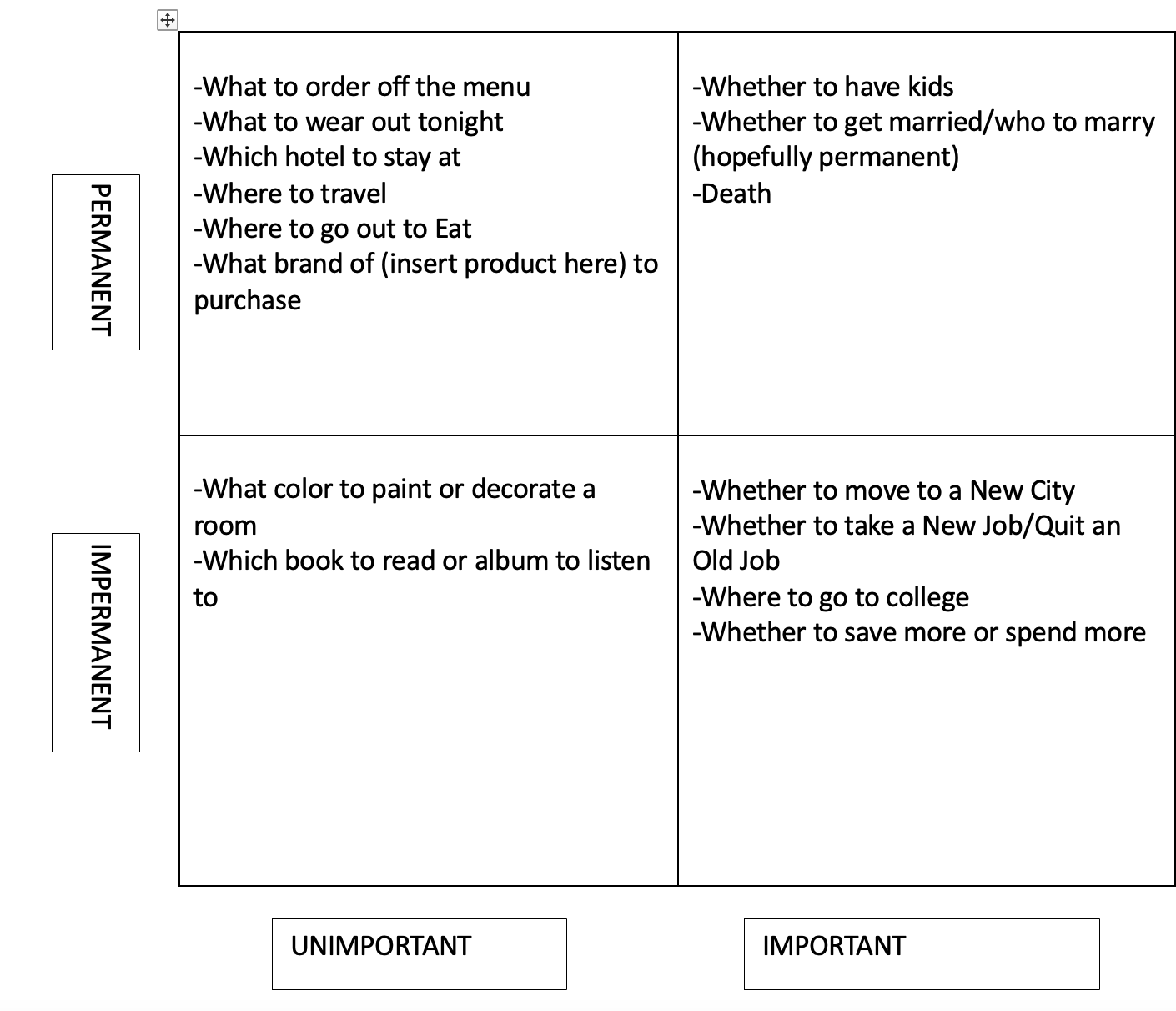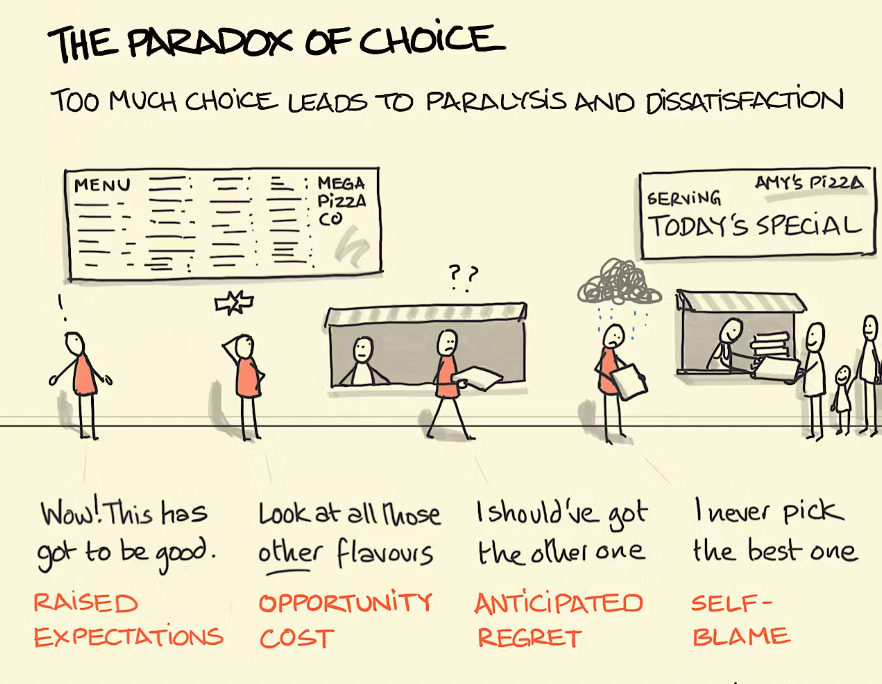- Leader's Lens
- Posts
- 🕶 Stop Agonizing Over Decisions
🕶 Stop Agonizing Over Decisions
INTRO
The last two month have been an absolute blessing.
I started a local media company and it is flying.
We are currently at 25k followers on instagram and almost 5000 newsletter subscribers.
And we already have sponsors supporting all of it.
Tomorrow I’m hosting a FREE virtual session focused on helping you create engaging videos and grow your audience online.
If you’ve been thinking about going out on your own or stepping into the world of coaching or consulting, this is for you.
(And if you can’t make it, register so we can send you the recording.)
Was this email forwarded to you?
Looking for the perfect HR software? SSR offers tailored guidance to help you choose the best tools for your organization!
Over 100,000 HR pros visit their site each month to consult SSR's detailed buyer guides and make smart HR software choices. Now you can also speak to their experts directly to get HR Software recommendations unique to your priorities and budget.
Check out their free HR software matching service today. There’s no fees, no fuss, and no obligation to buy software — just key insights to save you time and streamline your HR software buying process.
LEADER’S LENS
Stop Agonizing Over Decisions
(Note from Jacob: This week we have a special guest post from my friend Matt Cox. Matt is a real estate developer from New York. Excited he took the time to share this week.)
Back in early 2021, I had been living in Portland, OR for about 7 years and had been in the Pacific Northwest for my entire life. I knew that I was ready for a big change, I just didn’t know where exactly I wanted to go.
I had sold my condo in Portland and was living in one of those furnished apartments that are typically used by travel nurses or people who are “in between” permanent residences. I took a week long trip out to NYC (I had never been before at age 31), and within 24 hours of landing in the city I knew it would be the place I’d be moving to.

This was the Subway the day I moved to NYC, never seen it rain that hard in my life
People often talk about moving to a new location for years and never do it. I visited NYC in mid June of 2021, and was moved into my apartment by September 1. I’ve always been someone who is pretty decisive with this type of stuff, but I intentionally didn’t tell a soul (with the exception of my parents) that I was planning on moving until I had officially entered into a lease in early August. There were a couple reasons for this.
The first was I wanted to make sure that the move worked out before I went around telling people about it, mainly not to come off as an attention whore. The second and bigger reason was I didn’t want anyone trying to talk me out of it with a bunch of “What if it doesn’t work out?” mumbo jumbo. I signed a lease and wired my first month’s rent and deposit without ever seeing the apartment in person.
I barely even knew the neighborhood other than from what I had read online. Two and a half years later I’m in the same apartment and East Village Manhattan feels like home.
After I had already made the decision and was locked into a lease, I officially told people I was moving. As expected, I did get some of the “Have you thought about this?”, “What if x happens (x is always a negative thing, by the way)?” etc. Well, if it didn’t work out I could always (INSERT HORROR MOVIE SOUNDTRACK HERE)……..just move back?
We as humans have such an inclination to analyze the shit out of everything, which often results in us not taking chances that we should take. Our decision making process always seems to be around things that could go wrong, while ignoring things that could go right.
The same thing happened when I quit my stable corporate sales job to go all in on my real estate business. I can still hear the questions and comments. “Did you know you won’t have health insurance anymore?” “What about the benefits package?” “What if the market turns?” No one asked me “What if everything goes fucking awesome and you make a ton of money and love it?" And if it doesn’t work out? I’d just get a corporate job again.
The worst case scenario often isn’t this big bad boogeyman we make it out to be. Every job I’ve ever quit has ended with my boss telling me “If you ever want to come back, we will be here.” You know what’s scarier to me than the “worst case scenario” of everything going wrong? Never trying. If I didn’t move I’d have always looked back and thought “what if I hadn’t moved to NYC?” Same thing with quitting my job. If I didn’t quit my job and go all in on my business I’d always wonder what could have been.
One of my girlfriends friends showed her a really helpful framework for decision making, which she then shared with me. Take a look at the graphic below:

A really helpful exercise when you have a big decision in front of you is to look at which of these boxes the decision fits into. You’ll tend to find that many of the decisions that you’re making big and scary in your head are actually not that important or permanent. When you look at the graphic above, you’ll notice there are very few items that fall into the top right “permanent/important” category. By the way, I use “death” as a placeholder for things you can do (smoking, lack of exercise, etc) that can lead to a demise in your health and eventually to your death.
These decisions in the upper right are the ones that we should ACTUALLY put a ton of thought into and take very seriously. Many people will tell you that the person you choose to marry is the most important decision you will ever make in your life. I tend to agree. Act accordingly.
The bottom right are the decisions I talked about toward the beginning of this blog post. Moving to a new city or taking a new job are big life decisions. They’re also impermanent. These most certainly warrant putting some thought into, but these are also the decisions that people often can’t pull the trigger on when they should.
There are only so many variables to analyze. Life doesn’t happen in the analysis faze. Take the big swing. Take risks. Odds are you can recover from them even if they don’t work out. What you can’t do, is go back in time when you’re 80 years old and try the thing you should’ve tried at 20, 30 or 40.
The top left is permanent but unimportant. You of course cannot go back in time and un-eat the pasta that you ate for dinner when you were debating ordering the salmon. But I can also tell you that your pasta order will not alter the course of your life (unless it’s the pasta I had in Italy, that pasta was actually fucking life changing).
A really common one I see people labor over in the top left is what product or subscription to purchase. I’ve seen people spend days calling different cable providers in an effort to try to drive the price down ten bucks a month. Or calling every auto insurance provider on the face of the earth to try to get a deal. This stuff is not that important in the grand scheme. Get out of your head and focus on stuff that moves the dial. People spend hours and hours negotiating a cable bill, but won’t spend ten minutes to set up an investment account that could make them literally hundreds of thousands (if not millions) of dollars.
The bottom left is pretty similar to the top left. Make a decision and keep it moving.
American consumer society doesn’t make our decision making process any easier (seriously, go to Europe and look at how many fewer options there are on the shelf at the grocery store). In his famous book, psychologist Barry Schwartz describes the “Paradox of Choice.” We as humans think that we want more choices, but we don’t. The more choices we have, the more likely we are to be unhappy with the choice that we make.

Amy’s serves one type of pizza. The customers are all happy.
I encourage you to read the book (or at least a summary), but imagine you walk into a chocolate store and there are only two kinds of chocolate. You make a quick decision between the two, are on your way, and probably enjoy the heck out of your chocolate. Now imagine you walk into a chocolate shop with a hundred options. You agonize over which one to choose.
There are so many! What if I pick the wrong one?!
After ten minutes, you finally settle on one and don’t even feel that great about it. “What if I had gone with the white chocolate caramel instead of the dark chocolate with almond?” You consume your choice. It’s good. But there were 99 other options and you’ll never know if one of those would’ve been better. This is the paradox of choice in action. The more options we give ourselves, the less likely we are to be happy with the one we have (online dating, anyone?).
So how do we combat this human inclination to obsess over decisions that often aren’t that big of a deal? One strategy I like to use is the “worst case scenario” test. I originally heard about this from best selling author Tim Ferris. Basically, you take a look at a decision that is in front of you, and ask “what would be the worst possible outcome if I do this?”
I know that sounds like a negative approach, but it is actually quite the opposite. Stick with me here. When you run this test, you often find that the outcome you are dreading in your head is completely made up. So you move to a new city and it doesn’t work out? Worst case, you move back. You got a new job offer with a raise but you like your current company. If you take the job and it doesn’t work you can probably go back to your old company. I have a bunch of friends who have done this. Bottom line is that sometimes the biggest risk is not the one that you are imagining in your head. The biggest risk is likely that you never try the thing and look back and think “what if?”
You can run this test the other way as well. What is the best case scenario? Things can go wrong, things can also go right! When you ask “What is the worst case scenario?” vs “What is the best case scenario?”, you will often find that the potential upside is WAY bigger than the potential downside. Are there risks? Sure. Pretty much everything good in life involves a little bit (or even a lot a bit) of risk. Get used to taking calculated risks. Get used to being decisive. Life gets a lot more rewarding when you do.
Connect with Matt!
You can follow him on his blog, Instagram, or his website.


Reply